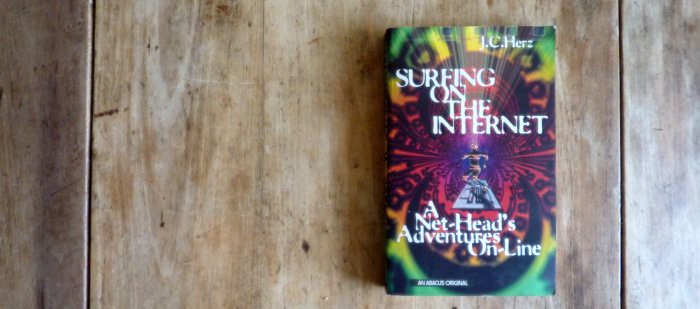This post is going to talk about sex quite a lot. I’m going to assume you’re all OK with that.
For me, technology, literature and sex are all bound up together, and this entanglement can be traced back to a single book: JC Herz’s Surfing on the Internet (Little, Brown; 1994). An exploration of the early net, a travelogue, an explicator of MUDs and MOOs, of chatrooms and founding memes; what was still, then, the Information Superhighway. I read the book in, I think, 1995. Within a month, I had a 28.8 modem and a Compuserve account. It’s probably impossible to underestimate the impact of this book on my life.

Surfing on the Internet was the first book I read to address sexuality in a way that I understood it: queer, fluid and exciting, and it pointed to a place where others could be found and it could be experienced: the internet. Yahoo Groups, in the form of the much missed #UKyoungandgaybutnotcamp2, in turn provided the venue for my coming out, as newly technologically enabled networks like it did and will continue to do for subsequent gay generations.
So, “Homo Computers”, an event at the Southbank Centre last week exploring gay geekdom and produced by the usually excellent House of Homosexual Culture, should have been spot on—but it rather missed the mark. Andrew Hodges, the primary biographer of Alan Turing, managed to dance around the subject, failing to illuminate Turing’s sexuality or usefully explicate his work. Likewise, David Baker, managing editor of Wired UK, assessed the impact of technology on gay lives without once speaking directly to sexuality. His points about the flexibility of modern working lives increasing opportunity made sense, but they seemed to apply to anyone (and if not to anyone, then, worse, only to metropolitan media gays). His final tale was, he admitted, apocryphal: that Turing’s suicide, with a cyanide-laced apple, was the inspiration for the technology company’s logo. A terrible and unworthy thought.
Gay lives are important; what gay people do is important—vitally important to other gay people in particular—and denying the impact of their sexuality is discriminatory, stupid and wrong-headed. To pretend that Turing’s sexuality had no impact on his work is ridiculous. It shaped his philosophical outlook following the early death of his first love, and it embedded him in the homosexual subculture of Cambridge in the 1930s. His oppression robbed Britain, and the world, of one of its finest minds. List-making of ‘gay’ heroes from Leonardo da Vinci to Oscar Wilde is less fashionable now that it once was, perhaps because its purpose—to support, validate and educate young, questioning gay people—has in large part been taken up and democratised by the internet. But it is no less necessary.
There’s a disconnect here, which Chris and I have been trying to unpick since. Confusion was a problem: the House of Homosexual Culture is usually about aspects of obviously queer culture, with a camp edge. This event was part of both the London Literature Festival and the Royal Society’s Festival of Science. And such a mixed heritage led it to both fall back on stereotypes (“gays don’t do maths and science”) and to shy away from the seedier aspects.
And the seedy aspects are important, I believe. Chris has been writing about Grindr, and exploring its data, and investigating academic approaches to sexual and social networks. I’ve previously addressed aspects of this over at Bookkake in Sotadic and Other Zones (on Burton, Grindr and the sexual applications of mapping technologies), and Throwing a little fleshlight on the matter (on LoveHoney and OKCupid). There’s an absence of investigation into this, it seems, in part due to the inherently discreet and closed nature of these networks. AshleyMadison.com alone has over 6 million users. And nobody talks about Flickr.
Much of this work is being done by academics, and is extremely valuable, but to a technologist’s eye, much of it lacks technical understanding. As Chris says, “Facebook and Twitter don’t know how lucky they are to have people like danah boyd digging into why and how people are using such things, and importantly making this information accessible and understandable to wider audiences.” We should be doing more of this, on our own terms.
*

One of the odd things about Surfing on the Internet, now, is its long transcriptions of chatlogs and MUD explorations—but it shouldn’t feel odd. Surfing… is a book not about the internet itself, but about our experience of it, an experience that takes place in a torrent of information that we construct, all the time, into narrative. (Remind me to talk about walking and storytelling through Wikipedia some time.) I’ve lamented the absences of such narratives from literature for some time.
I would, however, highlight two recent books which have addressed this (yes, both are written by friends. It’s how it works.) Max Schaefer’s Children of the Sun (Granta, 2010) delves into the strangely queer history of the British far right skinhead movements. It makes for frequently uncomfortable moments, and doesn’t shy away from seediness. In particular, it addresses the darker corners of online gay sexuality, of personal ads, no-strings sex, and fetishism, as something intricately connected to gay modes of living.

What is occurring here is the rejection in literature of the techno-deterministic assumptions currently being attacked in polemic by Clay Shirky:
“Techies were making the syllogism, if you put new technology into an existing situation, and new behaviour happens, then that technology caused the behaviour. But I’m saying if the new technology creates a new behaviour, it’s because it was allowing motivations that were previously locked out. These tools we now have allow for new behaviours – but they don’t cause them.”
In this case, as gay men are being increasingly enabled to activate latent desires, so literature is enabled to address new narrative experiences, the fragmented, always-on, holographically-distributed society of interests and attention we now inhabit.
The other work of importance here is Stewart Home’s Blood Rites of the Bourgeoisie (BookWorks, 2010), which I’ve written about previously. Home’s work takes the form of a narrative frequently and incessantly interrupted by spam-like texts: “The secret to a perfect climax. She wants to be penetrated and taken harder, longer and tighter. Define your masculine identity. Click now for great deals.” Words that are in this context shocking, yet, if all our reading is taken as one sheet, form a great part of our modern, daily literatures.
Even before Home’s wider theme—the misogyny, cliquishness and institutionalisation of the art world—is taken into account, what we’re seeing here is the most realist rendering possible of actual life. In an article in the Sunday Times (thankfully reproduced, without paywall, here), Tom McCarthy laments, or perhaps rages against, the increasingly current idea that the “realism” of novels is equated with self-expression and is only to be found in “this kind of vanity mirror where liberal culture can see itself reflected back”, or worse, in the rejection of fiction entirely as espoused by David Shields. If we are to understand ourselves we will do it through narrative. If we are engaged with technology, we should take up those tools too, as ways of understanding, without prejudice.
Thoughtful and illuminating stuff. Since you’ve namechecked Stewart Home, I’m assuming you’re equally aware of the pastiches of Richard Allen’s “Skinhead” books he (or, rather “Karen Eliot”) published in SMILE magazine at the dawn of the 1990s.
These only barely exaggerated the liminal homoeroticism of the Allen work. If you haven’t seen them, I think you’d get a kick out of them. Shod in oxblood DMs, of course.
Comment by AG — July 12, 2010 @ 1:54 pm
Thank you – and yes, very familiar with Stewart’s earlier work. I have a pretty complete collection (in part, thanks to Stewart’s own generosity) – and a pretty good collection of the Skinhead books too. The image of the protagonist shooting beneath London Bridge, bellowing out Abiezer Coppe while ‘beating out the primitive rhythm of the swamps’ is a hard one to forget…
Comment by James Bridle — July 12, 2010 @ 2:01 pm
Hmmmm
Not sure if Grindr – (see Spectator article)is an adornment to gay behavior….
Comment by Dad — July 22, 2010 @ 7:42 pm